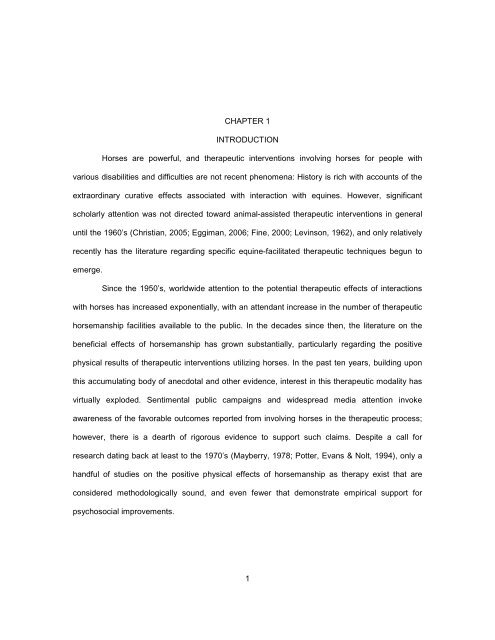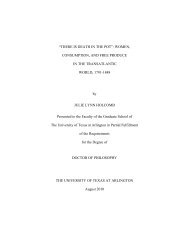A SYSTEMATIC REVIEW OF THE EFFECTS OF PSYCHOTHERAPY ...
A SYSTEMATIC REVIEW OF THE EFFECTS OF PSYCHOTHERAPY ...
A SYSTEMATIC REVIEW OF THE EFFECTS OF PSYCHOTHERAPY ...
You also want an ePaper? Increase the reach of your titles
YUMPU automatically turns print PDFs into web optimized ePapers that Google loves.
CHAPTER 1<br />
INTRODUCTION<br />
Horses are powerful, and therapeutic interventions involving horses for people with<br />
various disabilities and difficulties are not recent phenomena: History is rich with accounts of the<br />
extraordinary curative effects associated with interaction with equines. However, significant<br />
scholarly attention was not directed toward animal-assisted therapeutic interventions in general<br />
until the 1960’s (Christian, 2005; Eggiman, 2006; Fine, 2000; Levinson, 1962), and only relatively<br />
recently has the literature regarding specific equine-facilitated therapeutic techniques begun to<br />
emerge.<br />
Since the 1950’s, worldwide attention to the potential therapeutic effects of interactions<br />
with horses has increased exponentially, with an attendant increase in the number of therapeutic<br />
horsemanship facilities available to the public. In the decades since then, the literature on the<br />
beneficial effects of horsemanship has grown substantially, particularly regarding the positive<br />
physical results of therapeutic interventions utilizing horses. In the past ten years, building upon<br />
this accumulating body of anecdotal and other evidence, interest in this therapeutic modality has<br />
virtually exploded. Sentimental public campaigns and widespread media attention invoke<br />
awareness of the favorable outcomes reported from involving horses in the therapeutic process;<br />
however, there is a dearth of rigorous evidence to support such claims. Despite a call for<br />
research dating back at least to the 1970’s (Mayberry, 1978; Potter, Evans & Nolt, 1994), only a<br />
handful of studies on the positive physical effects of horsemanship as therapy exist that are<br />
considered methodologically sound, and even fewer that demonstrate empirical support for<br />
psychosocial improvements.<br />
1
















